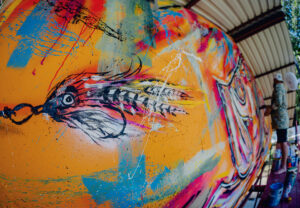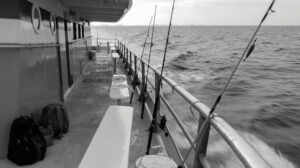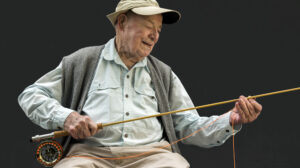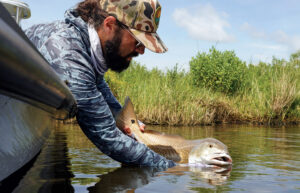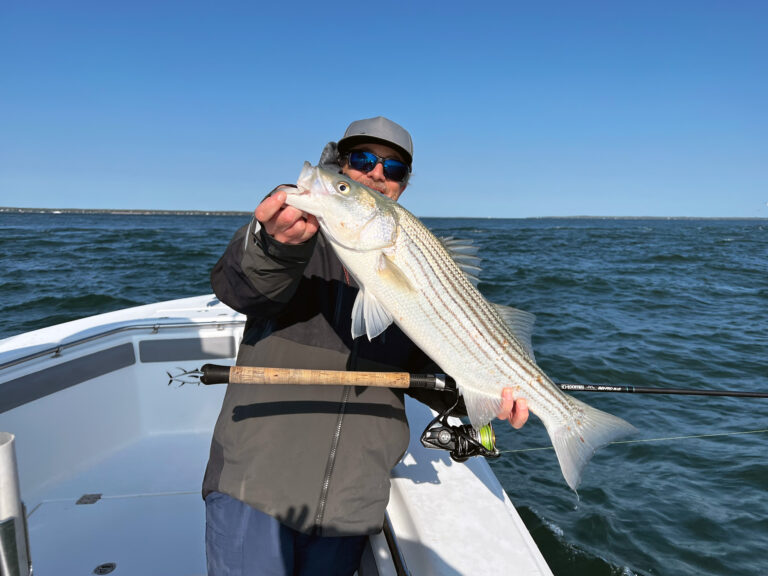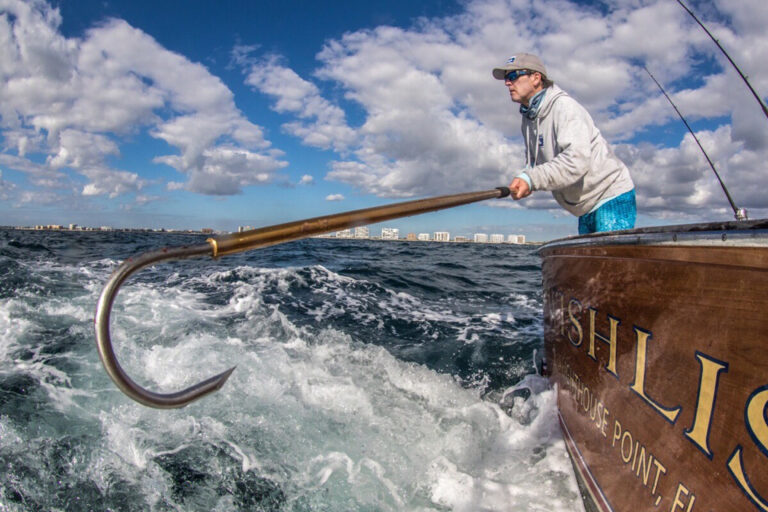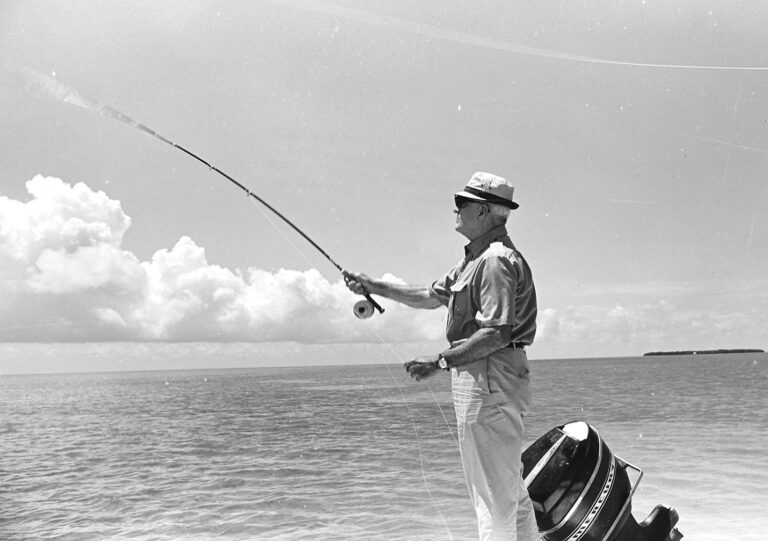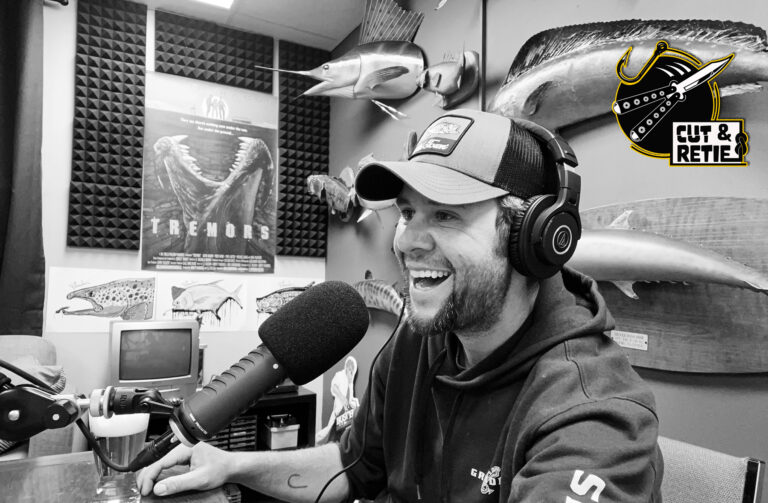Photos By Andy Newman
 Life after football. Former coach Jimmy Johnson enjoys fishing and kicking back in the Florida Keys.
Life after football. Former coach Jimmy Johnson enjoys fishing and kicking back in the Florida Keys.Legendary Dallas Cowboys coach Jimmy Johnson has a gym in his Florida home. It’s normal enough for somebody from his line of business, and its walls are covered with framed football awards, fishing photos and magazine covers picturing him. It’s the ultimate man cave, I think, until he leads me through a door on the ground level of his guest house. There, we enter a room lined with offshore-class rods and reels, plus stacks of lure boxes filled with rigs — rigs that Johnson tied. The space is an offshore angler’s nirvana.
Next, he leads me down the dock to his two black, diesel-powered SeaVees, a 39- and a 43-footer, hanging like onyx jewelry from lifts behind his oceanfront home. Each is named Three Rings, for his two Super Bowl wins with the Dallas Cowboys and national championship with the University of Miami in the Orange Bowl. The SeaVees are among 21 boats that Johnson has owned. “My 39 SeaVee is the most unbelievable boat I’ve ever had, for everything we do, from lobstering during mini-season to fishin’ by myself 25 miles out, or going to Bimini and Nassau,” he says. “It’s just a fantastic boat.”
Johnson is as passionate about fishing today as he once was about football. Remember, this is the man who declined a celebratory invitation to the White House after winning the 1993 Super Bowl, bluntly stating to Bill Clinton, “Thank you Mr. President, but I can’t. I’m going fishing in the Keys.” (Cowboys owner Jerry Jones quickly grabbed the phone and accepted on the team’s and Johnson’s behalf.)
 Johnson owns a 39- and a 43-foot SeaVee, both named Three Rings.
Johnson owns a 39- and a 43-foot SeaVee, both named Three Rings.Trial And Error
The coach did some fishing as a kid in Texas, and his move to Islamorada in the Florida Keys landed him in an area considered to be ground zero for world-class sport fishing. He faced a learning curve and took a methodical approach to gaining his current skill set. “Flying back and forth to L.A. every week for Fox NFL Sunday, I have a lot of time to read, so I read every fishing magazine there is,” he says. “I also went out on charter boats, not necessarily to fish but to watch the captains and their mates and see how they fish. And then, just picking it up on my own … just trial and error.”
Now, the coach says, he loves the freedom of solo angling because there’s no pressure to have to catch anything. “Fishing for me is relaxation,” he says. “That’s why I fish alone, and actually, catching fish is like bycatch.”
He hasn’t always fished to relax. There was a point when the coach’s competitive nature manifested itself in his fishing, as well. “I used to get really pissed off at myself,” Johnson says. “I should have gaffed it quicker, should have kept the boat in gear. I would be pissed if I made a mistake.”
But time has mellowed him. He describes fighting, and losing, a big mahi about a month earlier: “I did everything right, but he spit the hook out right at the boat and swam off. I smiled and thought to myself that for the first time in a long time, I lost a trophy fish and didn’t really care. I didn’t lose it because of a mistake I made. I just lost it because the fish won.”
 Johnson and son Chad head offshore.
Johnson and son Chad head offshore.‘Who Wants It?’
Out on his SeaVee 43 for an early morning fishing session, the agile 74-year-old puts the boat on autopilot and deftly bounces from one rod holder to another, setting up a five-line spread in minutes. The wahoo rigs are simple, and he prepared them all in advance. Drail weights with lengths of 480-pound wire attached are coupled to an assortment of wahoo lures. Johnson grabs these setups from a bucket and attaches each to a corresponding rod. When three lines are out, he flies up the tower like a Verizon lineman to swing out the outriggers. Back on deck, he sends out two more lures on the outriggers, jumps back to the helm to adjust the boat’s speed and finally settles down on the cooler with a Heineken Light.
He is fishing outside prime wahoo season with his son Chad and two longtime friends and fishing companions, Ted Connor and Ziggy Scholz. After trolling for 90 minutes without a hookup, they haul in the spread and head to a different spot to jig for amberjack. The coach plays his twin Garmin chart plotters with precision, placing the boat squarely over a wreck.
Three flutter jigs are dropped, and within seconds, Connor is hooked up. “Time to haul up the Volkswagen, who wants it?” the coach yells.
Connor does the honors. After 15 minutes, the fish breaks off, and Connor has a new rod rigged with another vertical jig. He gets another hookup, and this time it’s something big, either a much larger amberjack or a shark. Over the course of 40 minutes, the rod is passed among Connor, Scholz and the coach, each reeling until the fish, again, breaks off. Upon close inspection, Johnson is pleased to show everyone that it was not his uni-to-uni knot that failed, but rather the 80-pound fluorocarbon leader that parted.
 The former coach is a happy man when he’s chilling on “Three Rings” and the fish are cooperating.
The former coach is a happy man when he’s chilling on “Three Rings” and the fish are cooperating.Surprise Encounter
The first time Johnson landed an Atlantic blue marlin fishing alone — the first of five he’s caught over the years — he was about 15 miles offshore and had just finished setting up a multiple-line spread. “No sooner than I got the lines out, one takes off and starts screaming,” Johnson says. “I alternated between reeling, getting the other lines in, working the boat a little bit, keepin’ it tight, and finally, after an hour and 45 minutes, it came up on its side, so I knew it was done. I was exhausted, and my heart was going 90 miles an hour. I wouldn’t have kept it if it hadn’t died, so I brought it back in, put it on the rack, cleaned it and smoked it.”
And that wasn’t even his most epic day on the water. “They’re my most memorable days,” he says, “but my most fun days are going to Cay Sal, in the Bahamas, and catchin’ wahoo and big mahi.”
One of those “fun days” on the Cay Sal Bank off Cuba involved Johnson, Connor and Scholz. The three were fishing in Bahamian waters with, well, less than the required paperwork, when they saw a blip on the radar about 5 miles off. They decided to head for home. Three Rings is a quick vessel, so in no time, the blip dropped back to 7 miles. They were cruising at speed with the stereo blasting and had no idea that the blip was a Coast Guard cutter on routine patrol — and now chasing them. A short time later, a Coast Guard helicopter swooped down beside them, no more than 15 feet off the water, easily matching their speed. The pilot motioned to Johnson to shut down the vessel and get on the radio. As a boarding party from the cutter neared, Johnson heard one of the crew yell, “Hey, coach, we didn’t know it was you!” The authorities boarded Three Rings to do a routine safety check and sent the men on their way.
Johnson says he would never fish Cay Sal Bank without a Bahamian license again, and as a token of his appreciation, he says, he did three motivational speeches for the U.S. Department of Homeland Security and the Coast Guard. He’s usually paid, handsomely, for such speeches, he notes, “So I actually wound up losing money!”
 Johnson won two Super Bowl rings with the Dallas Cowboys. Looking back, did he retire too soon? The coach dismisses the notion and says living in the Keys had a lot to do with his decision.
Johnson won two Super Bowl rings with the Dallas Cowboys. Looking back, did he retire too soon? The coach dismisses the notion and says living in the Keys had a lot to do with his decision.Clarity
Johnson’s affinity for the water can be traced to his youth. He grew up in the Gulf Coast town of Port Arthur, Texas. “Daddy always had a little boat,” he says. “We were always around the water growing up, either fishing or boating or water skiing.”
His teenage years are where he found his insatiable drive to succeed. “We were very successful in high school,” he says. “In college we were undefeated national champions, so I was around success all the time, and the more you’re around it and you see all the good things that happen, you want more of it. I think the more success you have, the more competitive you get. It’s almost like a drug. I was driven to win it all because that’s what I was accustomed to.”
Fishing became part of Johnson’s adult life when he was head coach at the University of Miami in 1984. While there, he started spending time in the Florida Keys. “I got certified in scuba diving, and I was more into diving than fishing,” Johnson says. “I didn’t get hard-core fishing until I moved down here in ’93. I’ve been fishing … fishing hard for about 25 years.”
He was coaching at Dallas in ’93 and owned a vacation home in Crystal Beach, Texas, but he missed being on Florida waters. “Part of the reason I left the Cowboys was that I wanted to be around the water,” he says. “As soon as I saw the clarity of the water in the Keys, I sold my house in Crystal Beach.” He coached the Miami Dolphins from 1996 to 1999.
The coach, who is known for his positive attitude, has had his share of celebratory highs, but there was one big low along the way. In the late ’90s, his son Chad was mired in the depths of alcohol dependency, losing a successful career, friends and material possessions. Johnson remembers crying over not being able to help, despite repeated attempts, but he knew it was up to his son to make the decision to turn his life around. “Without question,” Johnson says, “nothing even comes close to how low I was when Chad was struggling.”
Chad eventually checked himself into a rehab facility and not only got his life back on track, but went on to dedicate himself to helping others by opening Tranquil Shores, a rehabilitation facility in Madeira Beach, Florida. In 2015, the coach visited Tranquil Shores. He read thank-you notes on a bulletin board that former clients had written to Chad, for saving their lives. “Even talking about it now gets me emotional because I know how far down he was and where he is now,” Johnson says. “I’m more proud of what Chad has accomplished than anything I ever did.”

Priorities
A lot of Cowboys fans still wonder whether Johnson left football too soon. He doesn’t wonder at all. “I didn’t retire too early,” he says. “I was ready to leave. The Keys had a lot to do with my leaving football because this is where I wanted to be.”
Johnson was the quintessential coach. He forged elite players and championship teams out of raw talent, sometimes talent no one else could see. Throughout his career, he relied heavily on his degree in industrial psychology to finesse the best out of players.
Former University of Miami and Dallas Cowboys quarterback Steve Walsh says Johnson’s psychology background helped him know what buttons to push. “He knew who he could get on and who he had to coddle, which is the skill of coaching,” Walsh says.
On another day, at the Big Chill, Johnson’s restaurant and bar in Key Largo, a captains’ meeting is being held for Jimmy Johnson’s Championship Fishing Week, a celebrity pro-am billfish tournament held in March with a $1.5 million guaranteed purse. Russell Maryland is there. He played for Johnson first at the University of Miami, then in Dallas (and with the Oakland Raiders and Green Bay Packers). “I just remember him being this tough-ass coach,” Maryland says, “but now, in this part of his life, he’s kinda all laid-back and smiles, and I’m like, where did all this come from? I guess fishing can have that effect on you.”
Back in the day, Johnson was, indeed, a tough-ass. One year, the Cowboys had clinched a playoff berth and were playing a regular-season game against the Washington Redskins. The team “flopped around out there and lost the game,” Johnson says. On the plane back home to Texas, he instructed the flight attendants to withhold dinner. “I was furious,” Johnson recalls, “and I wanted them to know that because of the way they played, they didn’t deserve dinner. I wanted it to hurt. I wanted them to be pissed at me. I didn’t want them to accept losing just because it was supposedly a meaningless game.”
Today, Johnson thinks back on those days as a whole other time. “I think it comes down to responsibility,” he says. “I was responsible for the success of our football team, and in some ways I was responsible to millions of people who were watching us. That’s why I was so demanding.”
He’s able to embrace a different attitude today, especially when he’s not on set for the Fox pregame show. When not working, he can usually be found aboard one of his SeaVees, trolling off the Keys, looking for fish.
“I like to be out there relaxin’, get about five or six lines out, open up a Heineken Light and just relax,” Johnson says with a smile. “That’s my priority.”




